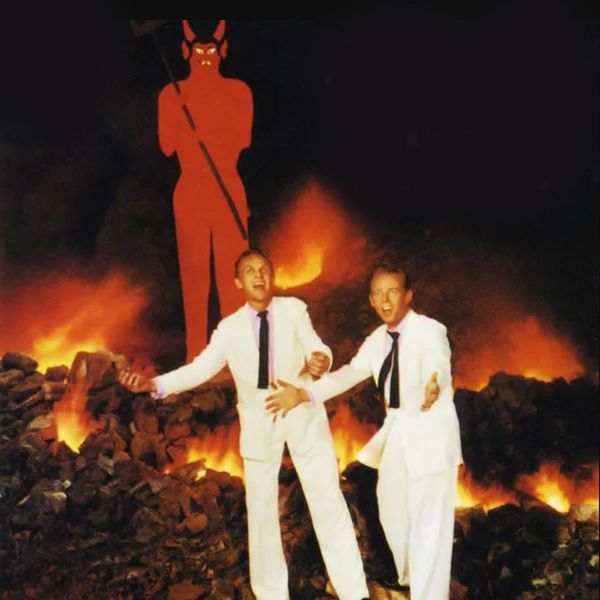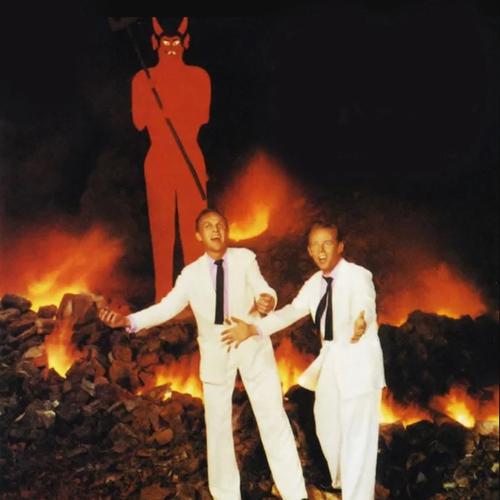




Link copied

“Satan is real”, the Louvin Brothers harmonize in their 1959 gospel bluegrass hit of the same name. Their words are earnest and their sentiment plain: Satan exists and he’s at work among us. “He can tempt you and lead you astray,” they warn as if their cool, languid twangs could keep hell’s lapping flames at bay.
The sibling duo’s song is an important document in country music, not because of its hellfire-scorched and brimstone-hued religious message, but because it introduced to the genre what would be a significant character for decades to come: the Devil himself.
The brothers’ ‘Satan is Real’ is by no means the first country song to name-drop the man downstairs. However, in their personification of the biblical bogeyman, they unconsciously made him a hit, casting him as the ultimate ne’er-do-well rather than a mere allegory. The Devil has since appeared in a number of country tunes, continually shapeshifting from an imposing caricature – horned and crimson – to something more human.
To understand the Devil’s role in country music today, one must first understand religion’s early role in the genre. With roots in the American South, a place greatly shaped by Christian doctrine, classic country tunes were often steeped in religion, borrowing lyrical themes that mirrored the collective beliefs of the region.
As a result, Old Scratch became as much of a main character in song as Christianity’s triune figurehead. The Devil has been regularly used in the genre to drive home religious themes, becoming the obvious scapegoat when exploring morality, temptation and the perpetual tug-of-war between sin and redemption. Not unlike the Louvin Brothers’ tune, many of those early country songs present a power struggle – good versus evil as some lost soul hangs in the balance.
Like in the 1966 honky tonk gospel hit, ‘Satan's Gotta Get Along Without Me,’ Buck Owens celebrates his escape from the Devil’s clutches and into the good Lord’s good graces. Bluegrass stalwarts The Seldom Scene beg for the same fate in their classic ‘Satan’s Choir’ as they continue to wrestle with sin.
Times, however, have changed, and with them, so have the songs. The narrative no longer teeters solely between heaven and hell, nor is the ultimate goal dependent on salvation or damnation. The Devil has also pivoted, shedding his role of spiritual antagonist and emerging as an embodiment of humanity – neither a wholly good nor bad player, just an honest one.
Satan’s transformation in country music has been subtle, at first transitioning from the pitchfork-wielding bad guy to more of an unconventional lesson teacher. The character of the Devil has often been used to work out the moral dilemmas of everyday life. He represents such challenges, making sin and strife something tangible. By confronting the Devil head-on in song, artists are able to address the consequences of their actions while exploring dueling themes of light and dark, right and wrong, virtue and vice.
The Devil so often meets people who are at a crossroads in their lives, searching for answers. In his 1970 solemn serenade ‘To Beat the Devil,’ a down-and-out Kris Kristofferson is nearly bewitched by Satan posing as an opportunistic barfly, attempting to pray on him at his lowest low.
“You see, the devil haunts a hungry man,” the singer-songwriter croons, taking away a valuable lesson from his encounter with the stranger. “If you don't wanna join him, you got to beat him.” And so, he does, drinking down the Devil’s beer and stealing his song.
However, not everyone is so lucky after going mano a mano with the Devil, and many end up learning an even more important adage: if you play with fire, you’re bound to get burned. Colter Wall’s 2015 ‘The Devil Wears a Suit and Tie’ finds him scolding his own foolishness after a deal with Satan turns sour.
He warns “'Cause that man's lessons had a price, oh sweet price / My sweet soul everlasting, a very own eternal light.” Meanwhile, Chris Knight can’t recall the exact details in his 2003 tune ‘Devil Behind the Wheel,’ but recounts a similar circumstance that ends with the hellraiser pulling the strings.
Others have taken Satan’s teachings in their stride. Chris Stapleton insists he knows right from wrong in his 2020 hit, ‘Devil Always Made Me Think Twice,’ claiming “Mama always set a good example / Daddy always gave me good advice / Jesus tried to steer me in the right direction,” but it was the Devil and everything he offered – the good-timing temptations and the sordid desires – that always had the upper hand. Here, the Devil serves as a mirror rather than a moral adversary, a way for Stapleton to challenge conventional beliefs and wear his defiance with a smoldering style.
The Devil’s evolution has culminated in this transformation. Adapting along with country music’s shifting narrative, Satan has grown more human, a philosopher of our innermost intricacies able to reflect back the shades of gray that paint our souls.
In another of his classics, ‘The Silver Tongued Devil and I,’ Kristofferson again brings up the hellion, but this time around, they are one. Satan no longer offers the singer a useful takeaway, instead “All he's good for is getting in trouble / And shiftin' his share of the blame,” but in the end, they’re a reflection of each other, both getting by on taking chances and paying dues.
The Devil has appeared in a number of country tunes, continually shapeshifting from an imposing caricature – horned and crimson – to something more human.
When he appears in song, this iteration of the Devil resonates with the human experience, understanding what it means to struggle; to do everything right and still fall short; or to do everything wrong and be content with just that. He urges artists to dig deep, and many of these musical encounters end in introspection, opening the players’ eyes to their faults, but also their fortitude.
Perhaps Ashley McBryde said it most fittingly when she sang in her 2023 tune, ‘The Devil I Know:’ “Everybody's got something to say / About how I gotta change my ways.” However, McBryde insists it’s she and the Devil who know what’s best, asserting, “Hell, there's hell everywhere I go / I'm just sticking with the devil I know.”
Whether or not Satan is as real as the Louvin Brothers profess, he continues to be a recurring character in country music, taking on many forms – the theological villain, the moral educator, the all-too-relatable companion – that vary greatly from one song to the next. He could be down in Georgia with Charlie Daniels or alongside Jason Isbell as his running mate. Whatever role he’s playing, the Devil has no doubt been the ultimate storyteller for decades of country music.
---
Listen to Holler's The Best Country Songs About The Devil playlist here.





